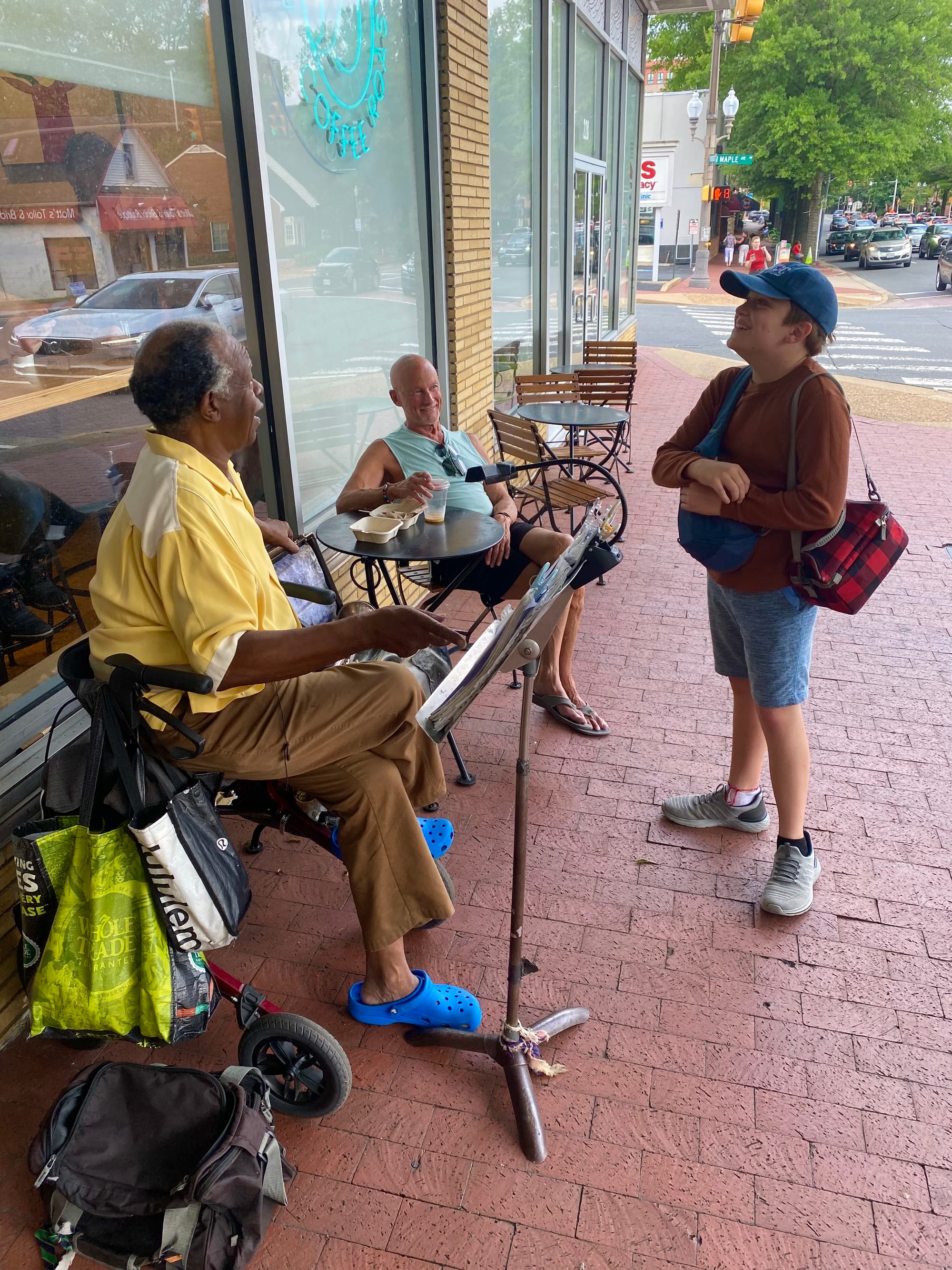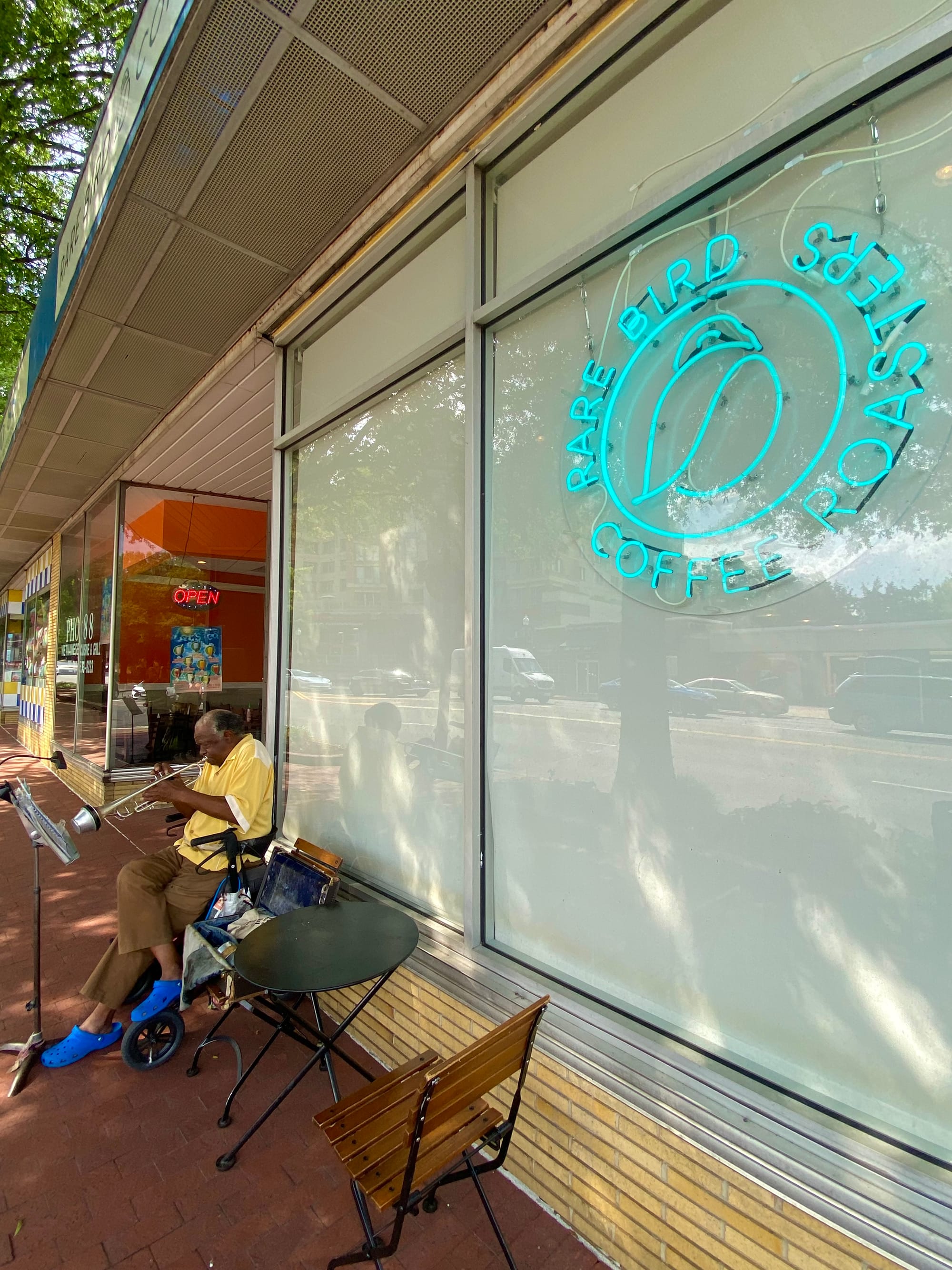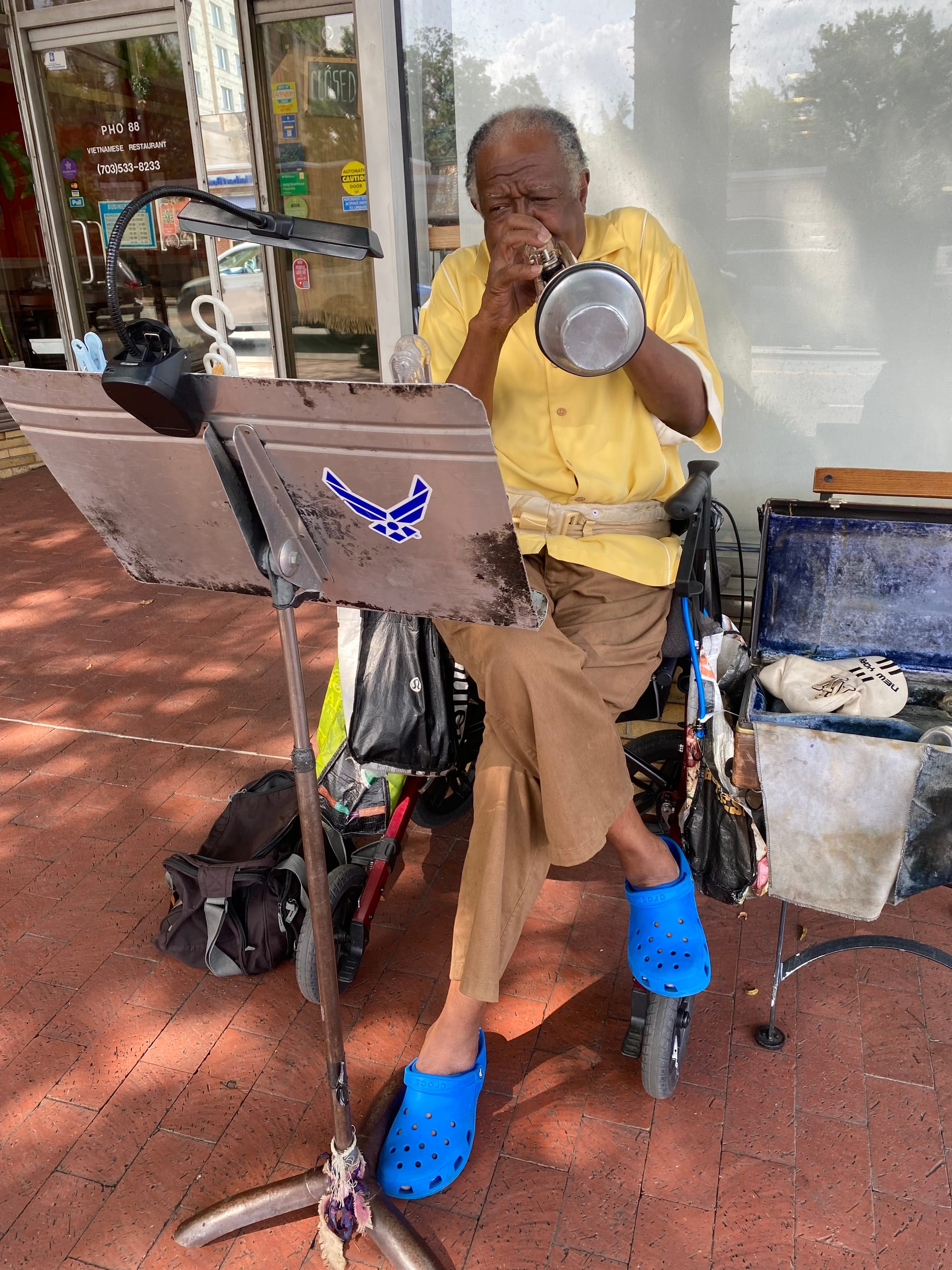Local Trumpeter Carries on Rich Jazz and Historical Legacy

Who’s that trumpet-playing man?
If you’ve visited or strolled by Rare Bird Coffee Roasters at 230 West Broad St. in downtown Falls Church the past few years, chances are you’ve seen or heard local neighbor and 40-year Falls Church resident Johnnie Johnson playing jazz, pop or traditional tunes on his trumpet, or sharing a friendly smile or hardy laugh with a passerby.
The Falls Church Independent interviewed Mr. Johnson to find out about the musician behind the trumpet mouthpiece, his backstory, and what makes his sidewalk songs and solos so enchanting.
Listening intently to a few of Johnson’s tunes and tossing a few bucks into his trumpet case as thanks, I had to wait several minutes before I could ask him any questions. He was catching up with a young musician friend strolling by. The young man was taking music lessons at the Community Center nearby and was telling a story about recently winning a violin in a music competition. For Johnson, this budding musician deserved all the attention in the world.

Once I struck up a conversation with Mr. Johnson, 73, it was clear he’d not only learned from great jazz masters, but his life’s story was filled with compelling turning points.
A resident at Winter Hills behind the West Broad Apartments with the Harris Teeter, Johnson said he’s lived and played music in the area for “about 45 years.”

A recent turning point for his outdoor busking came when a sidewalk stroller suggested he should think about moving from in front of the Starbucks at Harris Teeter to in front of Rare Bird. There, it might be warmer in the winter and cooler in the summer.
“About a year ago there was a young lady who was talking with me and she invited me over,” Johnson recalled. “And then, I discovered this place is perfect because the sun in the winter shines here – so you have to stay warm, right? And the sun’s rotation is different now in the summer – you see these big trees – so the sun can’t come through these trees [Laughs].”
Johnson says the folks at Rare Bird are nice about letting him play out front, but he brings his own drinks. “I drink a lot of water and they drink a lot of coffee [Laughs]. And I’m 73, and I’ve had my coffee before I get here.”
How about Johnson’s musical career? Turns out, it's also had a lot of twists and turns. Having been born into a racially-segregated school system in Folkston, Georgia, Johnson was fortunate school integration finally took place just as he was entering his junior high school years and striving to play in the school's band.
Johnson started playing the trumpet before he was 10 years-old. In band class, he was also trained in Sousaphone, clarinet and other instruments. “I started playing the trumpet when I was about nine,” Johnson said. “And going through high school, my school was integrated and I was playing Sousaphone for about three or four years.” At the last minute, Johnnie was asked to switch to trumpet instead of Sousaphone for the competition and the move was not only a success but set him on a lifelong path playing trumpet.
“The first year of my integration into a White high school, we won the state championship, in 1968,” Johnson recalled. NFL superstar, Champ Bailey, an African American, also hailed from Johnson’s Charleston County High School. Johnson laughed as he told a story about all the NFL scouts sniffing around the high schools looking for the best Black athletes even before the NFL broke the color barrier in 1946.
Another major turning point for Johnson was encountering a teacher and mentor that would shape his lifelong devotion to music.
After high school, Johnson “always studied music professionally.” Following a two-year Air Force career during the Vietnam Era (from 1971 to 1972), he chose to stay in the D.C. area – he had been stationed at Andrews Air Force Base in Maryland. “The reason I stayed in this area was the level of musical education,” he said. “I could get the education here because the military was bringing in all the top players from around the country.”

Though Johnson didn’t play in the Air Force Band, he studied under Scott Shelstaff, “a premier trombone soloist in the military.” Johnson had met Shelstaff near Fort Belvoir. Today, because of Shelstaff’s skilled musical instruction, Johnson says Shelstaff was “the best thing that ever happened to me.”
Not unlike other Black soldiers during Vietnam, Johnson struggled with racial discrimination in the U.S. Air Force. “Well, the military and I had a battle,” Johnson remembered. “I was staying in Washington. I was shipped to Andrews and I spent most of the last part of my time fighting the military because they had promised me that I could go into engineering, but when my orders came in, they put me in mechanics.”
“I can’t say for certain, but it looked like many of the things I had been through before where things are supposed to go a certain way but because of your skin color… ,” Johnson recalled. “But, the fact is that had I accepted [the mechanics job], I would have been a little better off. Because I should have taken all the education from any source I could. And that’s why I should have stayed. But, I learned that later. It wasn’t like I had someone to teach me about that or talk to me like that. I was on my own.”
Today, Johnson has three children who attended schools in Sterling, Virginia, and a wife of 35 years. “One of my daughters is a lawyer,” he said. “One of my daughters is an ordained minister. And, my youngest daughter gave me four sons and one great grandkid.”
Since Johnson plays so many instruments, I asked why he chose to play exclusively trumpet outdoors. “The trumpet is where I’m going and the trumpet is where I’ve always been,” he said. “And I tell you – not to boast, but – Miles Davis called me one day. I had only one lesson from Miles Davis. But, he told me that if I wanted to learn how to play trumpet, I should listen to Louis Armstrong, you know? And that was my lesson! [Laughs].”
Johnson recalled some of the most important lessons he ever learned on the trumpet. Warming up is absolutely key to performing well, he learned. “You’ve got to treat what you’re about to use properly.” And just 20 minutes of practice per day can ensure you keep growing as a musician.
Looking at Johnson’s sheet music book, I asked him about what he likes to play. “Well, I think I may have always played certain things according to the season,” he said. “Some tunes I’d play anytime, but some tunes I play for the season. Like 'My Favorite Things,' I can play at any season, because it’s not just about Santa Claus [Laughs].”
Johnson had just finished playing a jazz tune from his book, “I Remember Clifford” by Benny Golden. He recalled that his teacher Harold Chavis with whom he played “for 20 or 30 years” had played with the legendary Clifford Brown, the subject of the song. Brown died young. Chavis was only 14 “when he played with Clifford,” Johnson recalled. “And Clifford died at an age no one should die. I think he was maybe 23 or 26. Not sure. But, he had been, for the most part, one of the greatest trumpet players America has ever produced.”
Recently, due to back pain, Johnson has had to reduce the number of sheet music books he carries with him to play, but he draws from four or five favorite thick volumes.
Does Johnson ever play with other musicians? “Actually, about three weeks ago,” he recalled, “some friends of mine, stopped by, saw me play and came out here to play with me. They have a coffee shop down at the Eden Center, it’s a very special place, Little Saigon they call it. And they built a fountain off in a corner of it. And they actually have it so that people can sit around and play in the water. And they have bands sitting right up there sitting right in front of that fountain. And they came by here and I started going up there with them.”
So, what does Johnson think about the locals who stroll by and see him play? Turns out, they’re not all strangers. “Well, some people I may have known before I started even living here,” he said. “Actually, during 35 years, I worked as a developer and I worked on renovating homes from start to finish and doing all the work on them. Mr. Brown [of Mr. Brown's Hardware] was one of the main people I’d go through. So over the last 40 years, I’ve been in the area. And my father-in-law lives near the area, over in Arlington. And I had to stay with him for about seven years, because he couldn’t find anyone to take care of him. So, I told him years before that I’d be around to take care of him.”
As we finished chatting, a mom with an older kid walked past and waved an enthusiastic hello to Johnson. It seems there’s always a good vibe when Johnson plays. “No matter what, we are all a direct representative of God,” he said, “no matter whether you’re a president or anything. So you get your cues from that.”
“I once decided that a smile was the least I could offer a person, so I offer that smile regardless" of how they act, Johnson said. “And you see that young man there? [pointing to the older kid walking past with his mom], he started coming ‘round when he was just two and he started collecting rocks. The stroller his mom pushed him in, the bottom is still filled with rocks [Laughs]. And, not a few either.” And, “he would say to his mom, “Let’s go and see Mr. Player.”
“So, you can call me, Mr. Player!”
By Christopher Jones






Member discussion